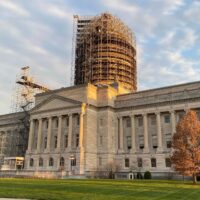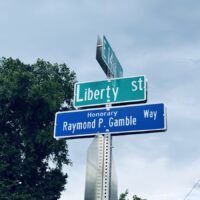Voters in a Kansas referendum Tuesday maintained a right to abortion in the state constitution, encouraging opponents of a broad anti-abortion amendment on Kentucky’s Nov. 8 ballot.
The Kansas measure would have nullified a 2019 court decision that said the state’s constitution guaranteed a right to abortion. Voters rejected it by 61% to 39% in unofficial returns.
The Kentucky ballot has a proposed constitutional amendment designed to thwart a similar decision that could stem from a lawsuit that is moving through Kentucky courts. It would say that the Kentucky Constitution does not create a right to abortion or government funding of it.
Democratic Gov. Andy Beshear has come out against the amendment, noting that it includes no exceptions for rape or incest. Beshear generally favors abortion rights, but the rape and incest exceptions are popular.
The lopsided Kansas vote “gives me a lot more hope” for defeating the Kentucky amendment, said Heather Ayer, campaign coordinator for the American Civil Liberties Union of Kentucky. She said they considered the Kansas vote a bellwether for Kentucky, and What we were hearing is that it would be much closer.”
Advocates of the Kansas proposal thought putting it on the primary ballot would give it a better chance of winning, but urban and suburban turnout was unusually high, swamping the largely anti-abortion rural vote.
“We are all still reviewing the outcome in Kansas and where the voter turnout was greater and how this may have impacted their ballot responses,” Kentucky Right to Life Association Executive Director Addia Wuchner said in an email.
Ayer and Wuchner both said Kansas voters may have been confused by the odd wording of the amendment there, and Ayer acknowledged that voters unsure about a proposal are more likely to reject it. But she said the Protect Kentucky Access campaign against the amendment will also educate voters about it.
The ballot question in Kentucky reads, “Are you in favor of amending the Constitution of Kentucky by creating a new Section of the Constitution to be numbered Section 26A to state as follows: To protect human life, nothing in this Constitution shall be construed to secure or protect a right to abortion or require the funding of abortion?”
Wuchner called that “very clear and concise” but Ayer said it is wordy, uses uncommon language and unlike most ballot proposals, is phrased in the negative rather than the positive.
As for the Kansas vote, Wuchner said too many anti-abortion voters may have been complacent. “Perhaps, with the Roe v. Wade overturn, too many folks on our side may think we’ve won the battle,” she wrote. “In fact, the battle on the matter has shifted from the federal level and has returned to the states. Kentucky is an overwhelming pro-life state. Our laws reflect the long-held values of Kentuckians. . . . We will remain laser focused on motivating our overwhelmingly pro-life state to turn out. Kentuckians need to know that the battle is now in the states, and in Kentucky on Nov 8.”
The Kentucky measure was put on the ballot by the state legislature, through a bill sponsored by Republican Rep. Joseph Fischer, who is challenging Justice Michelle Keller, a registered independent, in an officially nonpartisan race for Northern Kentucky’s state Supreme Court seat.
The state Supreme Court is already dealing with procedural issues in a lawsuit that could prompt it to render a decision like the high court in Kansas. It involves two state laws, one that bans abortion after six weeks and the “trigger law” written to ban almost all abortions if the U.S. Supreme Court overturned its 1973 Roe v. Wade decision, which it did June 24.
Jefferson Circuit Judge Mitch Perry largely accepted the legal arguments of Kentucky’s two abortion clinics, both in Louisville, that the laws violate rights to privacy and religious freedom implicitly created by the state constitution.
Perry issued an injunction blocking enforcement of the laws, but Republican Attorney General Daniel Cameron got Court of Appeals Judge Larry Thompson of Pikeville to block Perry’s order pending the appeals court’s consideration of the case, beginning with a motion to send it straight to the state Supreme Court. That made abortion illegal in Kentucky, at least temporarily, except when needed to save the life of the woman or prevent a serious, permanent disability to a life-sustaining organ.
Al Cross is professor emeritus of journalism at the University of Kentucky. He was the longest-serving political writer for the Louisville Courier Journal (1989-2004) and national president of the Society of Professional Journalists in 2001-02. He joined the Kentucky Journalism Hall of Fame in 2010. The NKyTribune is the home for his commentary which is also offered to other publications.






